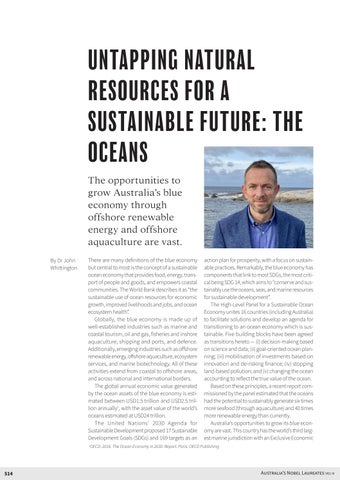UNTAPPING NATURAL RESOURCES FOR A SUSTAINABLE FUTURE: THE OCEANS The opportunities to grow Australia’s blue economy through offshore renewable energy and offshore aquaculture are vast. By Dr John Whittington
There are many definitions of the blue economy but central to most is the concept of a sustainable ocean economy that provides food, energy, transport of people and goods, and empowers coastal communities. The World Bank describes it as “the sustainable use of ocean resources for economic growth, improved livelihoods and jobs, and ocean ecosystem health”. Globally, the blue economy is made up of well-established industries such as marine and coastal tourism, oil and gas, fisheries and inshore aquaculture, shipping and ports, and defence. Additionally, emerging industries such as offshore renewable energy, offshore aquaculture, ecosystem services, and marine biotechnology. All of these activities extend from coastal to offshore areas, and across national and international borders. The global annual economic value generated by the ocean assets of the blue economy is estimated between USD1.5 trillion and USD2.5 trillion annually1, with the asset value of the world’s oceans estimated at USD24 trillion. The United Nations’ 2030 Agenda for Sustainable Development proposed 17 Sustainable Development Goals (SDGs) and 169 targets as an
action plan for prosperity, with a focus on sustainable practices. Remarkably, the blue economy has components that link to most SDGs, the most critical being SDG 14, which aims to “conserve and sustainably use the oceans, seas, and marine resources for sustainable development”. The High-Level Panel for a Sustainable Ocean Economy unites 16 countries (including Australia) to facilitate solutions and develop an agenda for transitioning to an ocean economy which is sustainable. Five building blocks have been agreed as transitions hereto — (i) decision-making based on science and data; (ii) goal-oriented ocean planning; (iii) mobilisation of investments based on innovation and de-risking finance; (iv) stopping land-based pollution; and (v) changing the ocean accounting to reflect the true value of the ocean. Based on these principles, a recent report commissioned by the panel estimated that the oceans had the potential to sustainably generate six times more seafood (through aquaculture) and 40 times more renewable energy than currently. Australia’s opportunities to grow its blue economy are vast. This country has the world’s third largest marine jurisdiction with an Exclusive Economic
OECD. 2016. The Ocean Economy in 2030. Report. Paris: OECD Publishing
1
514
Australia’s Nobel Laureates VOL III
